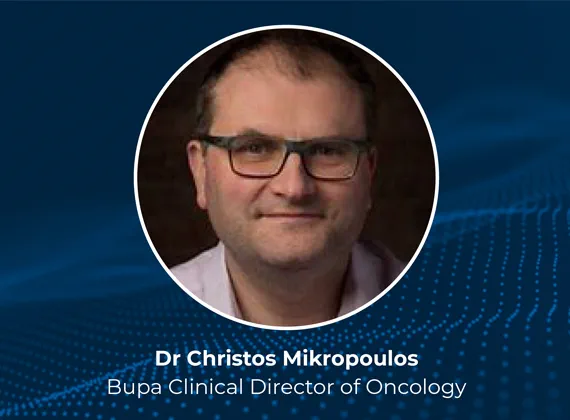The hidden C
Innovations and
improving outcomes

In the past 20 years, the risk of being diagnosed with cancer has increased by 8%1, but the likelihood of dying from the disease has fallen by 16%2. Dr Christos Mikropoulos, Clinical Director of Oncology at Bupa explains how advances in diagnosis and treatment are transforming care and outcomes.
Every time a cell divides, the genetic code we inherit from our parents is copied and random mistakes can occur for no apparent reason. Errors also arise as a result of exposure to a carcinogen, such as cigarette smoke or UV radiation, which damages the DNA carrying this code.3
The longer we live, the more these mistakes build up and the greater the chance they will give rise to cancer. Cancer genomics has led to a new era of increasingly personalised medicine, where we can identify druggable targets at a molecular level and offer the right treatment to the right patient. Next generation sequencing has allowed the rapid and efficient identification of more targets for treatments.
The up-front costs of this more personalised approach can be high, but the potential savings — in lives and costs — are also high. Bupa experts meet every month to evaluate new therapies and assess which will provide the best outcomes and value for our members.
Our robust “out of license” treatment process allows members to access treatments before they are available via the NHS where clinically appropriate and we have regular conversations with leading pharma companies around opportunities and future treatments.
Through Patient Reported Outcome Measures we collect multi-dimensional real-world data to ensure patients shape the future of care and the peer-reviewed resources in our Cancer Hub support our customers and non-customers, with early diagnosis and informed decision-making.
The future is here:
Genomic diagnostics
Next generation sequencing is progressing rapidly and there are now many more tailored tests which use gene panels or whole exome sequencing to identify targets for treatment. We have a formal panel which meets at least once a month to evaluate these diagnostics and identify the most useful.

Generic targeted therapies
Biosimilars are generic versions of targeted therapies such as Herceptin and MabThera which to look for specific proteins to home in on cancer cells. Where appropriate, our contracts allow members to access biosimilars and this provides significant savings, either by limiting direct costs to Trusts, or by limiting premium cost inflation.

Surgical innovation
Robotic laparoscopic surgery is being used more widely and we are speaking to HCA Healthcare about the potential for using this technology for a colorectal pathway.

Smarter screening
Artificial Intelligence using cancer-detection software to triage mammograms has recently been proven effective in a large clinical trial. We are monitoring developments as this technology has the potential to free radiologists to focus on mammograms with potential abnormalities.4

Immune-system therapies
CAR-T is a very complex and expensive therapy which involves collecting a patient’s immune-system T-cells, altering them so they recognise a specific target on the cancer cells and then returning them via an IV drip. Patient Reported Outcome Measures will be an important tool in assessing CAR-T, alongside our strong commercial and clinical controls to ensure high quality treatment is accessed at an appropriate price. Corporate clients can also opt-out of CAR-T where this is the right option for their employees.

Exciting new therapies should mean improved outcomes for patients despite increasing cancer rates. Significant focus for Bupa is getting the right treatment with appropriate clinical outcomes for the individual, and using pricing power and commercial focus to protect long-term viability of healthcare schemes.


